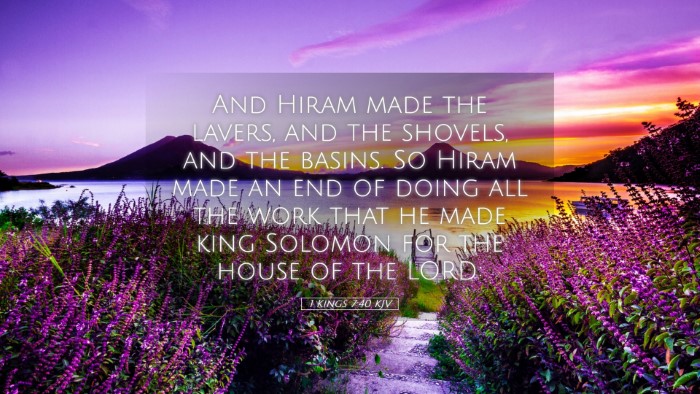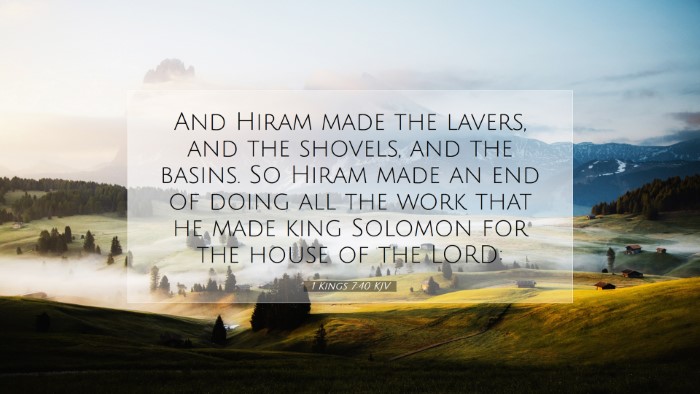Commentary on 1 Kings 7:40
Verse Context: 1 Kings 7:40 states:
"And Hiram made the lavers, and the shovels, and the basins. So Hiram made an end of doing all the work that he made king Solomon for the house of the Lord:"
Introduction
This verse concludes the account of the contributions made by Hiram, the skilled craftsman of Tyre, in constructing various aspects of Solomon's temple. The passage emphasizes the completion of Hiram's work, underscoring the collaboration between Solomon and Hiram in fulfilling the divine mandate of building the house of the Lord.
Historical Background
In the context of the ancient Near East, the construction of temples was a significant cultural and religious undertaking. Solomon, as the king of Israel, sought not only to demonstrate Israel’s wealth and power but also to fulfill God's promise to establish a place for His name. Hiram, recognized for his expertise in metalwork and construction, played a crucial role in this monumental task.
Contribution of Hiram
According to Albert Barnes, Hiram's contributions included not only the lavers and basins but also tools that were essential for the temple rituals and sacrifices. These items held both practical and symbolic significance.
Commentary Insights
1. Matthew Henry's Perspective
Matthew Henry emphasizes the importance of readiness in serving God. He highlights Hiram's diligence in completing his work, suggesting that it serves as an example for all laborers in God's kingdom. Each item crafted was a step toward fulfilling God's design for worship among His people.
2. Albert Barnes' Exegesis
Barnes provides a detailed analysis of the items mentioned - lavers, shovels, and basins. He explains that the lavers were used for ceremonial washings, which symbolize the need for purity in approaching God. The shovels and basins served practical functions in the sacrificial system, reiterating the theme of dedication and holiness in the worship services.
3. Adam Clarke's Observations
Adam Clarke notes the biblical numerics and symbolism behind the various items made. He points out that these items not only serve physical functions but also denote spiritual realities. The lavers for washing could symbolize the cleansing that is required to enter into the presence of God.
Theological Reflections
This verse invites deeper theological reflection regarding the character of God and His expectations of worship. The meticulous care with which Hiram crafted these items suggests that God is a God of order, beauty, and intentionality. Worship, therefore, must be approached with reverence, reflecting the holiness of God.
Worship and Artistry
As noted by various commentators, including Henry and Barnes, the artistry displayed in the temple's craftsmanship reveals the creativeness of God reflected in human work. This element signifies that worship can sometimes require the integration of skill and creativity, accentuating that the arts belong to the realm of worship.
Completion of God’s Work
The phrase "made an end" can be understood as a significant theological notion reflecting completion in the context of God’s mission. God desires His work to be completed, and this completion not only signifies physical construction but speaks to the fullness of God’s promises being realized. The role of human craftsmanship works alongside divine instruction, fulfilling the duality of divine grace and human effort.
Practical Applications for Today
- Service in the Kingdom: The verse encourages believers to actively participate in God's work with excellence and commitment.
- Importance of Skill: It highlights that skills, be they in art, craft, or administration, are vital for fulfilling God’s purposes.
- Holistic Worship: Encourages modern worshipers to glorify God not just through music or preaching but through their craft and day-to-day jobs.
Conclusion
1 Kings 7:40 serves as a vital reminder of the significance of every detail in the work of the Lord. The legacy of Hiram is not merely as a craftsman but as a partner in the divine plan for worship. As pastors, students, and theologians reflect on this passage, they are challenged to consider their own contributions to God’s kingdom and the importance of doing so with all diligence and skill.


